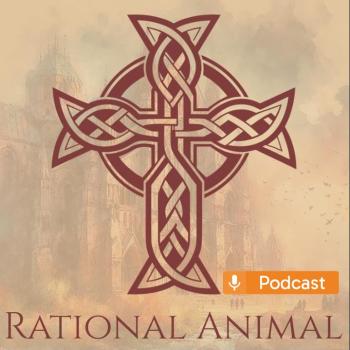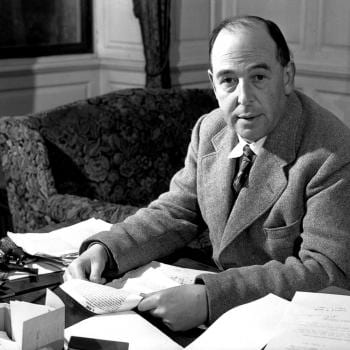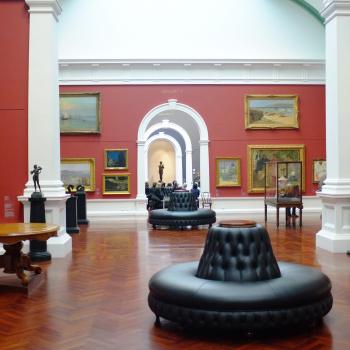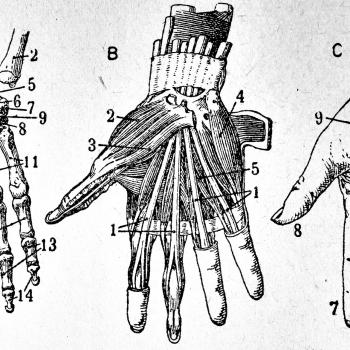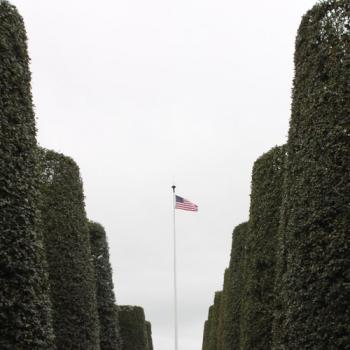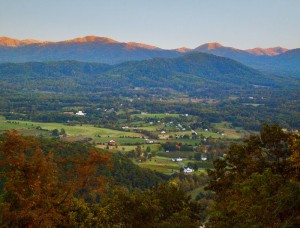 Last Sunday my wife decided to celebrate the end of our semester by taking a drive on a scenic stretch of Route 151, a two-lane road that winds along the foothills of the Blue Ridge Mountains between Lynchburg and Charlottesville. Often on this road, you find yourself sliding through a flashing green canopy of leaves. More than once, a climbing series of hairpin turns will open onto sweeping green valleys.
Last Sunday my wife decided to celebrate the end of our semester by taking a drive on a scenic stretch of Route 151, a two-lane road that winds along the foothills of the Blue Ridge Mountains between Lynchburg and Charlottesville. Often on this road, you find yourself sliding through a flashing green canopy of leaves. More than once, a climbing series of hairpin turns will open onto sweeping green valleys.
The mountains roll soft as the curves of a human body, and surround some valleys on all sides, creating a wide natural bowl protecting small Edens of farmhouses and fertile land. Yesterday, the mountaintops reached almost, but not quite, to the cumulus clouds—fat globs, heavy and motionless, as if they had been hung there by invisible wires and would drop of their own weight otherwise. It was one of those Virginia days in spring when the beauty of it all strikes you dumb but for exclaimed clichés.
Not that you would need more reason to make this drive, but strung along Route 151 are seven wineries, three breweries, one cidery, and one distillery—all do tastings, and some have restaurants. It is dubbed the Brew Ridge Trail, and it travels across Afton Mountain.
I once had a friend who smoked “Sweet Afton” cigarettes. Though they were made in Ireland, the package advertised them as “Virginia Cigarettes,” as this is where they got the tobacco. The name does not come from our Afton however, but from the Robert Burns poem about a river in Scotland. Under Burns’ picture on the pack, are these lines:
Flow gently, sweet Afton, among thy green braes,
Flow gently, I’ll sing thee a song in thy praise
If you think it is all too poetic, too romantic for a pack of smokes, no worry; the government warning on Irish cigarettes gets right to the point: “Smoking Kills.”
In the New York Times Magazine that very morning, a man asked The Ethicist if it was okay to give cigarettes leftover from a party—the only place he and his friends smoke—to some homeless people. The Ethicist said the real ethical question was why he would assume his friends have the right to make their own choice about smoking cigarettes he offers them, but not homeless people. “Why does having a home grant someone special agency?”
Most of the homes along this road are quite modest, but some are old southern mansions, restored from the grand days of tobacco farming. A great deal of wealth in this area came from tobacco, a fact that our children are taught at the Point of Honor Museum, by a woman garbed in colonial dress and bonnet and apron. What she doesn’t mention—or at least didn’t mention when Liz went along with our daughter Grace on a field trip—is the role slavery played in the accumulation of that wealth.
When I went with my son Evan several years ago on a field trip to Avoca, Charles Lynch’s home, the guide did mention slavery in passing, only to note that slave quarters were once out behind the house. In the place where they once stood, now stands a model of a settler’s house, to show the children what frontier living would have been like, which I suppose makes for happier field trips. (A model slave home is being constructed on the grounds of Thomas Jefferson’s Poplar Forest.)
On Sunday, I saw no slave quarters out back of any of the massive old homes along 151. I’m sure it is partly because slave houses were not built to last. Several years ago, Liz and I went to St. John, another place of breathtaking beauty. Along a walking trail at Cinnamon Bay, we saw the graves of plantation owners and their wives. The guidebook informed us that the slaves were buried in shallow graves down at the beach—the beach where at that moment people lay in the sun, paddled standup boards, snorkeled, and swam. Were human skeletons under them as they took their ease on the sand? Had they long since washed out and become a part of the ocean’s cycle?
We sit here in the courtyard of Blue Mountain Brewery on a late Sunday afternoon. We are sampling craft brews—most here are too hoppy for Liz, so I get to finish them. The sun is hot, but the cooling breeze is brisk. In the field beyond, lines are strung for the new crop of hops. Beyond that, pastureland stretches toward mountains that sport cloud shadows like spots on the backs of Holstein cows. Everything seems a little bit unreal, as if this natural bowl we are inside is a diorama box created by a giant Wes Anderson, everything placed precisely in its spot.
This place. It is so beautiful that for a brief instant I almost, but not quite, forget its brutal human history.
Vic Sizemore earned his MFA in fiction from Seattle Pacific University in 2009. His short stories are published or forthcoming in StoryQuarterly, Southern Humanities Review, Connecticut Review, Portland Review, Blue Mesa Review, Sou’wester, Silk Road Review, Atticus Review, PANK Magazine Fiction Fix, Vol.1 Brooklyn, Conclave, and elsewhere. Excerpts from his novel The Calling are published in Connecticut Review, Portland Review, Prick of the Spindle, Burrow Press Review, Rock & Sling, and Relief. His fiction has won the New Millennium Writings Award for Fiction, and been nominated for Best American Nonrequired Reading and a Pushcart Prize. You can find Vic at http://vicsizemore.wordpress.com/.



